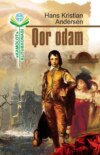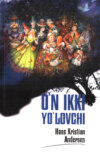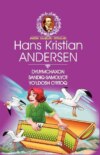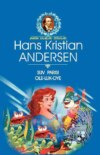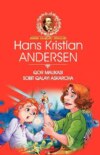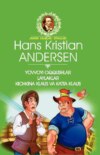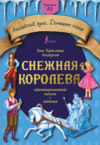Kitabı oku: «What the Moon Saw: and Other Tales», sayfa 9
UNDER THE WILLOW TREE
The region round the little town of Kjöge is very bleak and bare. The town certainly lies by the sea shore, which is always beautiful, but just there it might be more beautiful than it is: all around are flat fields, and it is a long way to the forest. But when one is very much at home in a place, one always finds something beautiful, and something that one longs for in the most charming spot in the world that is strange to us. We confess that, by the utmost boundary of the little town, where some humble gardens skirt the streamlet that falls into the sea, it must be very pretty in summer; and this was the opinion of the two children from neighbouring houses, who were playing there, and forcing their way through the gooseberry bushes, to get to one another. In one of the gardens stood an elder tree, and in the other an old willow, and under the latter the children were especially very fond of playing; they were allowed to play there, though, indeed, the tree stood close beside the stream, and they might easily have fallen into the water. But the eye of God watches over the little ones; if it did not, they would be badly off. And, moreover, they were very careful with respect to the water; in fact, the boy was so much afraid of it, that they could not lure him into the sea in summer, when the other children were splashing about in the waves. Accordingly, he was famously jeered and mocked at, and had to bear the jeering and mockery as best he could. But once Joanna, the neighbour's little girl, dreamed she was sailing in a boat, and Knud waded out to join her till the water rose, first to his neck, and afterwards closed over his head, so that he disappeared altogether. From the time when little Knud heard of this dream, he would no longer bear the teasing of the other boys. He might go into the water now, he said, for Joanna had dreamed it. He certainly never carried the idea into practice, but the dream was his great guide for all that.
Their parents, who were poor people, often took tea together, and Knud and Joanna played in the gardens and on the high-road, where a row of willows had been planted beside the skirting ditch; these trees, with their polled tops, certainly did not look beautiful, but they were not put there for ornament, but for use. The old willow tree in the garden was much handsomer, and therefore the children were fond of sitting under it. In the town itself there was a great market-place, and at the time of the fair this place was covered with whole streets of tents and booths, containing silk ribbons, boots, and everything that a person could wish for. There was great crowding, and generally the weather was rainy; but it did not destroy the fragrance of the honey-cakes and the gingerbread, of which there was a booth quite full; and the best of it was, that the man who kept this booth came every year to lodge during the fair-time in the dwelling of little Knud's father. Consequently there came a present of a bit of gingerbread every now and then, and of course Joanna received her share of the gift. But, perhaps the most charming thing of all was that the gingerbread dealer knew all sorts of tales, and could even relate histories about his own gingerbread cakes; and one evening, in particular, he told a story about them which made such a deep impression on the children that they never forgot it; and for that reason it is perhaps advisable that we should hear it too, more especially as the story is not long.
"On the shop-board," he said, "lay two gingerbread cakes, one in the shape of a man with a hat, the other of a maiden without a bonnet; both their faces were on the side that was uppermost, for they were to be looked at on that side, and not on the other; and, indeed, most people have a favourable side from which they should be viewed. On the left side the man wore a bitter almond – that was his heart; but the maiden, on the other hand, was honey-cake all over. They were placed as samples on the shop-board, and remaining there a long time, at last they fell in love with one another, but neither told the other, as they should have done if they had expected anything to come of it.
"'He is a man, and therefore he must speak first,' she thought; but she felt quite contented, for she knew her love was returned.
"His thoughts were far more extravagant, as is always the case with a man. He dreamed that he was a real street boy, that he had four pennies of his own, and that he purchased the maiden, and ate her up. So they lay on the shop-board for weeks and weeks, and grew dry and hard, but the thoughts of the maiden became ever more gentle and maidenly.
"'It is enough for me that I have lived on the same table with him,' she said, and crack! she broke in two.
"'If she had only known of my love, she would have kept together a little longer,' he thought.
"And that is the story, and here they are, both of them," said the baker in conclusion. "They are remarkable for their curious history, and for their silent love, which never came to anything. And there they are for you!" and, so saying, he gave Joanna the man who was yet entire, and Knud got the broken maiden; but the children had been so much impressed by the story that they could not summon courage to eat the lovers up.
On the following day they went out with them to the churchyard, and sat down by the church wall, which is covered, winter and summer, with the most luxuriant ivy as with a rich carpet. Here they stood the two cake figures up in the sunshine among the green leaves, and told the story to a group of other children; they told them of the silent love which led to nothing. It was called love because the story was so lovely, on that they all agreed. But when they turned to look again at the gingerbread pair, a big boy, out of mischief, had eaten up the broken maiden. The children cried about this, and afterwards – probably that the poor lover might not be left in the world lonely and desolate – they ate him up too; but they never forgot the story.
The children were always together by the elder tree and under the willow, and the little girl sang the most beautiful songs with a voice that was clear as a bell. Knud, on the other hand, had not a note of music in him, but he knew the words of the songs, and that, at least, was something. The people of Kjöge, even to the rich wife of the fancy-shop keeper, stood still and listened when Joanna sang. "She has a very sweet voice, that little girl," they said.
Those were glorious days, but they could not last for ever. The neighbours were neighbours no longer. The little maiden's mother was dead, and the father intended to marry again, in the capital, where he had been promised a living as a messenger, which was to be a very lucrative office. And the neighbours separated regretfully, the children weeping heartily, but the parents promised that they should at least write to one another once a year.
And Knud was bound apprentice to a shoemaker, for the big boy could not be allowed to run wild any longer; and moreover he was confirmed.
Ah, how gladly on that day of celebration would he have been in Copenhagen with little Joanna! but he remained in Kjöge, and had never yet been to Copenhagen, though the little town is only five Danish miles distant from the capital; but far across the bay, when the sky was clear, Knud had seen the towers in the distance, and on the day of his confirmation he could distinctly see the golden cross on the principal church glittering in the sun.
Ah, how often his thoughts were with Joanna! Did she think of him? Yes. Towards Christmas there came a letter from her father to the parents of Knud, to say that they were getting on very well in Copenhagen, and especially might Joanna look forward to a brilliant future on the strength of her fine voice. She had been engaged in the theatre in which people sing, and was already earning some money, out of which she sent her dear neighbours of Kjöge a dollar for the merry Christmas Eve. They were to drink her health, she had herself added in a postscript, and in the same postscript there stood further, "A kind greeting to Knud."
The whole family wept: and yet all this was very pleasant; those were joyful tears that they shed. Knud's thoughts had been occupied every day with Joanna; and now he knew that she also thought of him: and the nearer the time came when his apprenticeship would be over, the more clearly did it appear to him that he was very fond of Joanna, and that she must be his wife; and when he thought of this, a smile came upon his lips, and he drew the thread twice as fast as before, and pressed his foot hard against the knee-strap. He ran the awl far into his finger, but he did not care for that. He determined not to play the dumb lover, as the two gingerbread cakes had done: the story should teach him a lesson.
And now he was a journeyman, and his knapsack was packed ready for his journey: at length, for the first time in his life, he was to go to Copenhagen, where a master was already waiting for him. How glad Joanna would be! She was now seventeen years old, and he nineteen.
Already in Kjöge he had wanted to buy a gold ring for her; but he recollected that such things were to be had far better in Copenhagen. And now he took leave of his parents, and on a rainy day, late in the autumn, went forth on foot out of the town of his birth. The leaves were falling down from the trees, and he arrived at his new master's in the metropolis wet to the skin. Next Sunday he was to pay a visit to Joanna's father. The new journeyman's clothes were brought forth, and the new hat from Kjöge was put on, which became Knud very well, for till this time he had only worn a cap. And he found the house he sought, and mounted flight after flight of stairs until he became almost giddy. It was terrible to him to see how people lived piled up one over the other in the dreadful city.
Everything in the room had a prosperous look, and Joanna's father received him very kindly. To the new wife he was a stranger, but she shook hands with him, and gave him some coffee.
"Joanna will be glad to see you," said the father: "you have grown quite a nice young man. You shall see her presently. She is a girl who rejoices my heart, and, please God, she will rejoice it yet more. She has her own room now, and pays us rent for it." And the father knocked quite politely at the door, as if he were a visitor, and then they went in.
But how pretty everything was in that room! such an apartment was certainly not to be found in all Kjöge: the queen herself could not be more charmingly lodged. There were carpets, there were window curtains quite down to the floor, and around were flowers and pictures, and a mirror into which there was almost danger that a visitor might step, for it was as large as a door; and there was even a velvet chair.
Knud saw all this at a glance: and yet he saw nothing but Joanna. She was a grown maiden, quite different from what Knud had fancied her, and much more beautiful. In all Kjöge there was not a girl like her. How graceful she was, and with what an odd unfamiliar glance she looked at Knud! But that was only for a moment, and then she rushed towards him as if she would have kissed him. She did not really do so, but she came very near it. Yes, she was certainly rejoiced at the arrival of the friend of her youth! The tears were actually in her eyes; and she had much to say, and many questions to put concerning all, from Knud's parents down to the elder tree and the willow, which she called Elder-mother and Willow-father, as if they had been human beings; and indeed they might pass as such, just as well as the gingerbread cakes; and of these she spoke too, and of their silent love, and how they had lain upon the shop-board and split in two – and then she laughed very heartily; but the blood mounted into Knud's cheeks, and his heart beat thick and fast. No, she had not grown proud at all. And it was through her – he noticed it well – that her parents invited him to stay the whole evening with them; and she poured out the tea and gave him a cup with her own hands; and afterwards she took a book and read aloud to them, and it seemed to Knud that what she read was all about himself and his love, for it matched so well with his thoughts; and then she sang a simple song, but through her singing it became like a history, and seemed to be the outpouring of her very heart. Yes, certainly she was fond of Knud. The tears coursed down his cheeks – he could not restrain them, nor could he speak a single word: he seemed to himself as if he were struck dumb; and yet she pressed his hand, and said,
"You have a good heart, Knud – remain always as you are now."
That was an evening of matchless delight to Knud; to sleep after it was impossible, and accordingly Knud did not sleep.
At parting, Joanna's father had said, "Now, you won't forget us altogether! Don't let the whole winter go by without once coming to see us again;" and therefore he could very well go again the next Sunday, and resolved to do so. But every evening when working hours were over – and they worked by candlelight there – Knud went out through the town: he went into the street in which Joanna lived, and looked up at her window; it was almost always lit up, and one evening he could see the shadow of her face quite plainly on the curtain – and that was a grand evening for him. His master's wife did not like his gallivanting abroad every evening, as she expressed it; and she shook her head; but the master only smiled.
"He is only a young fellow," he said.
But Knud thought to himself: "On Sunday I shall see her, and I shall tell her how completely she reigns in my heart and soul, and that she must be my little wife. I know I am only a poor journeyman shoemaker, but I shall work and strive – yes, I shall tell her so. Nothing comes of silent love: I have learned that from the cakes."
And Sunday came round, and Knud sallied forth; but, unluckily, they were all invited out for that evening, and were obliged to tell him so. Joanna pressed his hand and said,
"Have you ever been to the theatre? You must go once. I shall sing on Wednesday, and if you have time on that evening, I will send you a ticket; my father knows where your master lives."
How kind that was of her! And on Wednesday at noon he received a sealed paper, with no words written in it; but the ticket was there, and in the evening Knud went to the theatre for the first time in his life. And what did he see? He saw Joanna, and how charming and how beautiful she looked! She was certainly married to a stranger, but that was all in the play – something that was only make-believe, as Knud knew very well. If it had been real, he thought, she would never have had the heart to send him a ticket that he might go and see it. And all the people shouted and applauded, and Knud cried out "hurrah!"
Even the king smiled at Joanna, and seemed to delight in her. Ah, how small Knud felt! but then he loved her so dearly, and thought that she loved him too; but it was for the man to speak the first word, as the gingerbread maiden in the child's story had taught him: and there was a great deal for him in that story.
So soon as Sunday came, he went again. He felt as if he were going into a church. Joanna was alone, and received him – it could not have happened more fortunately. "It is well that you are come," she said.
"I had an idea of sending my father to you, only I felt a presentiment that you would be here this evening; for I must tell you that I start for France on Friday: I must go there, if I am to become efficient."
It seemed to Knud as if the whole room were whirling round and round with him. He felt as if his heart would presently burst: no tear rose to his eyes, but still it was easy to see how sorrowful he was.
"You honest, faithful soul!" she exclaimed; and these words of hers loosened Knud's tongue. He told her how constantly he loved her, and that she must become his wife; and as he said this, he saw Joanna change colour and turn pale. She let his hand fall, and answered, seriously and mournfully,
"Knud, do not make yourself and me unhappy. I shall always be a good sister to you, one in whom you may trust, but I shall never be anything more." And she drew her white hand over his hot forehead. "Heaven gives us strength for much," she said, "if we only endeavour to do our best."
At that moment the stepmother came into the room; and Joanna said quickly,
"Knud is quite inconsolable because I am going away. Come, be a man," she continued, and laid her hand upon his shoulder; and it seemed as if they had been talking of the journey, and nothing else. "You are a child," she added; "but now you must be good and reasonable, as you used to be under the willow tree, when we were both children."
But Knud felt as if the whole world had slid out of its course, and his thoughts were like a loose thread fluttering to and fro in the wind. He stayed, though he could not remember if she had asked him to stay; and she was kind and good, and poured out his tea for him, and sang to him. It had not the old tone, and yet it was wonderfully beautiful, and made his heart feel ready to burst. And then they parted. Knud did not offer her his hand, but she seized it, and said,
"Surely you will shake hands with your sister at parting, old playfellow!"
And she smiled through the tears that were rolling over her cheeks, and she repeated the word "brother" – and certainly there was good consolation in that – and thus they parted.
She sailed to France, and Knud wandered about the muddy streets of Copenhagen. The other journeymen in the workshop asked him why he went about so gloomily, and told him he should go and amuse himself with them, for he was a young fellow.
And they went with him to the dancing-rooms. He saw many handsome girls there, but certainly not one like Joanna; and here, where he thought to forget her, she stood more vividly than ever before the eyes of his soul. "Heaven gives us strength for a great deal, if we only try to do our best," she had said; and holy thoughts came into his mind, and he folded his hands. The violins played, and the girls danced round in a circle; and he was quite startled, for it seemed to him as if he were in a place to which he ought not to have brought Joanna – for she was there with him, in his heart; and accordingly he went out. He ran through the streets, and passed by the house where she had dwelt: it was dark there, dark everywhere, and empty, and lonely. The world went on its course, but Knud pursued his lonely way, unheedingly.
The winter came, and the streams were frozen. Everything seemed to be preparing for a burial. But when spring returned, and the first steamer was to start, a longing seized him to go away, far, far into the world, but not to France. So he packed his knapsack, and wandered far into the German land, from city to city, without rest or peace; and it was not till he came to the glorious old city of Nuremberg that he could master his restless spirit; and in Nuremberg, therefore, he decided to remain.
Nuremberg is a wonderful old city, and looks as if it were cut out of an old picture-book. The streets seem to stretch themselves along just as they please. The houses do not like standing in regular ranks. Gables with little towers, arabesques, and pillars, start out over the pathway, and from the strange peaked roofs water-spouts, formed like dragons or great slim dogs, extend far over the street.
Here in the market-place stood Knud, with his knapsack on his back. He stood by one of the old fountains that are adorned with splendid bronze figures, scriptural and historical, rising up between the gushing jets of water. A pretty servant-maid was just filling her pails, and she gave Knud a refreshing draught; and as her hand was full of roses, she gave him one of the flowers, and he accepted it as a good omen.
From the neighbouring church the strains of the organ were sounding: they seemed to him as familiar as the tones of the organ at home at Kjöge; and he went into the great cathedral. The sunlight streamed in through the stained glass windows, between the two lofty slender pillars. His spirit became prayerful, and peace returned to his soul.
And he sought and found a good master in Nuremberg, with whom he stayed, and in whose house he learned the German language.
The old moat round the town has been converted into a number of little kitchen gardens; but the high walls are standing yet, with their heavy towers. The ropemaker twists his ropes on a gallery or walk built of wood, inside the town wall, where elder bushes grow out of the clefts and cracks, spreading their green twigs over the little low houses that stand below; and in one of these dwelt the master with whom Knud worked; and over the little garret window at which Knud sat the elder waved its branches.
Here he lived through a summer and a winter; but when the spring came again he could bear it no longer. The elder was in blossom, and its fragrance reminded him so of home, that he fancied himself back in the garden at Kjöge; and therefore Knud went away from his master, and dwelt with another, farther in the town, over whose house no elder bush grew.
His workshop was quite close to one of the old stone bridges, by a low water-mill, that rushed and foamed always. Without, rolled the roaring stream, hemmed in by houses, whose old decayed gables looked ready to topple down into the water. No elder grew here – there was not even a flower-pot with its little green plant; but just opposite the workshop stood a great old willow tree, that seemed to cling fast to the house, for fear of being carried away by the water, and which stretched forth its branches over the river, just as the willow at Kjöge spread its arms across the streamlet by the gardens there.
Yes, he had certainly gone from the "Elder-mother" to the "Willow-father." The tree here had something, especially on moonlight evenings, that went straight to his heart – and that something was not in the moonlight, but in the old tree itself.
Nevertheless, he could not remain. Why not? Ask the willow tree, ask the blooming elder! And therefore he bade farewell to his master in Nuremberg, and journeyed onward.
To no one did he speak of Joanna – in his secret heart he hid his sorrow; and he thought of the deep meaning in the old childish story of the two cakes. Now he understood why the man had a bitter almond in his breast – he himself felt the bitterness of it; and Joanna, who was always so gentle and kind, was typified by the honey-cake. The strap of his knapsack seemed so tight across his chest that he could scarcely breathe; he loosened it, but was not relieved. He saw but half the world around him; the other half he carried about him, and within himself. And thus it stood with him.
Not till he came in sight of the high mountains did the world appear freer to him; and now his thoughts were turned without, and tears came into his eyes.
The Alps appeared to him as the folded wings of the earth; how if they were to unfold themselves, and display their variegated pictures of black woods, foaming waters, clouds, and masses of snow? At the last day, he thought, the world will lift up its great wings, and mount upwards towards the sky, and burst like a soap-bubble in the glance of the Highest!
"Ah," sighed he, "that the Last Day were come!"
Silently he wandered through the land, that seemed to him as an orchard covered with soft turf. From the wooden balconies of the houses the girls who sat busy with their lace-making nodded at him; the summits of the mountains glowed in the red sun of the evening; and when he saw the green lakes gleaming among the dark trees, he thought of the coast by the Bay of Kjöge, and there was a longing in his bosom, but it was pain no more.
There where the Rhine rolls onward like a great billow, and bursts, and is changed into snow-white, gleaming, cloud-like masses, as if clouds were being created there, with the rainbow fluttering like a loose band above them; there he thought of the water-mill at Kjöge, with its rushing, foaming water.
Gladly would he have remained in the quiet Rhenish town, but here too were too many elder trees and willows, and therefore he journeyed on, over the high, mighty mountains, through shattered walls of rock, and on roads that clung like swallows' nests to the mountain-side. The waters foamed on in the depths, the clouds were below him, and he strode on over thistles, Alpine roses, and snow, in the warm summer sun; and saying farewell to the lands of the North, he passed on under the shade of blooming chestnut trees, and through vineyards and fields of maize. The mountains were a wall between him and all his recollections; and he wished it to be so.
Before him lay a great glorious city which they called Milano, and here he found a German master who gave him work. They were an old pious couple, in whose workshop he now laboured. And the two old people became quite fond of the quiet journeyman, who said little, but worked all the more, and led a pious Christian life. To himself also it seemed as if Heaven had lifted the heavy burden from his heart.
His favourite pastime was to mount now and then upon the mighty marble church, which seemed to him to have been formed of the snow of his native land, fashioned into roofs, and pinnacles, and decorated open halls: from every corner and every point the white statues smiled upon him. Above him was the blue sky, below him the city and the wide-spreading Lombard plains, and towards the north the high mountains clad with perpetual snow; and he thought of the church at Kjöge, with its red, ivy-covered walls, but he did not long to go thither: here, beyond the mountains, he would be buried.
He had dwelt here a year, and three years had passed away since he left his home, when one day his master took him into the city, not to the circus where riders exhibited, but to the opera, where was a hall worth seeing. There were seven storeys, from each of which beautiful silken curtains hung down, and from the ground to the dizzy height of the roof sat elegant ladies, with bouquets of flowers in their hands, as if they were at a ball, and the gentlemen were in full dress, and many of them decorated with gold and silver. It was as bright there as in the brilliant sunshine, and the music rolled gloriously through the building. Everything was much more splendid than in the theatre at Copenhagen, but then Joanna had been there, and – could it be? Yes, it was like magic – she was here also! for the curtain rose, and Joanna appeared, dressed in silk and gold, with a crown upon her head: she sang as he thought none but angels could sing, and came far forward, quite to the front of the stage, and smiled as only Joanna could smile, and looked straight down at Knud. Poor Knud seized his master's hand, and called out aloud, "Joanna!" but no one heard but the master, who nodded his head, for the loud music sounded above everything. "Yes, yes, her name is Joanna," said the master; and he drew forth a printed playbill, and showed Knud her name – for the full name was printed there.
No, it was not a dream! All the people applauded, and threw wreaths and flowers to her, and every time she went away they called her back, so that she was always going and coming.
In the street the people crowded round her carriage, and drew it away in triumph. Knud was in the foremost row, and shouted as joyously as any; and when the carriage stopped before her brilliantly lighted house, Knud stood close beside the door of the carriage. It flew open, and she stepped out: the light fell upon her dear face, as she smiled, and made a kindly gesture of thanks, and appeared deeply moved. Knud looked straight into her face, and she looked into his, but she did not know him. A man, with a star glittering on his breast, gave her his arm – and it was whispered about that the two were engaged.
Then Knud went home and packed his knapsack. He was determined to go back to his own home, to the elder and the willow tree – ah, under the willow tree! A whole life is sometimes lived through in a single hour.
The old couple begged him to remain, but no words could induce him to stay. It was in vain they told him that winter was coming, and pointed out that snow had already fallen in the mountains; he said he could march on, with his knapsack on his back, in the wake of the slow-moving carriage, for which they would have to clear a path.
So he went away towards the mountains, and marched up them and down them. His strength was giving way, but still he saw no village, no house; he marched on towards the north. The stars gleamed above him, his feet stumbled, and his head grew dizzy. Deep in the valley stars were shining too, and it seemed as if there were another sky below him. He felt he was ill. The stars below him became more and more numerous, and glowed brighter and brighter, and moved to and fro. It was a little town whose lights beamed there; and when he understood that, he exerted the remains of his strength, and at last reached the shelter of a humble inn.
That night and the whole of the following day he remained there, for his body required rest and refreshment. It was thawing; there was rain in the valley. But early on the second morning came a man with an organ, who played a tune of home; and now Knud could stay no longer. He continued his journey towards the north, marching onward for many days with haste and hurry, as if he were trying to get home before all were dead there; but to no one did he speak of his longing, for no one would have believed in the sorrow of his heart, the deepest a human heart can feel. Such a grief is not for the world, for it is not amusing; nor is it even for friends; and moreover he had no friends – a stranger, he wandered through strange lands towards his home in the north.



